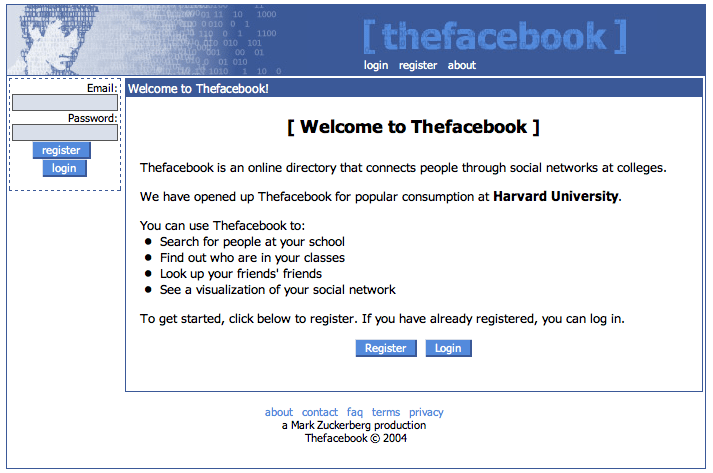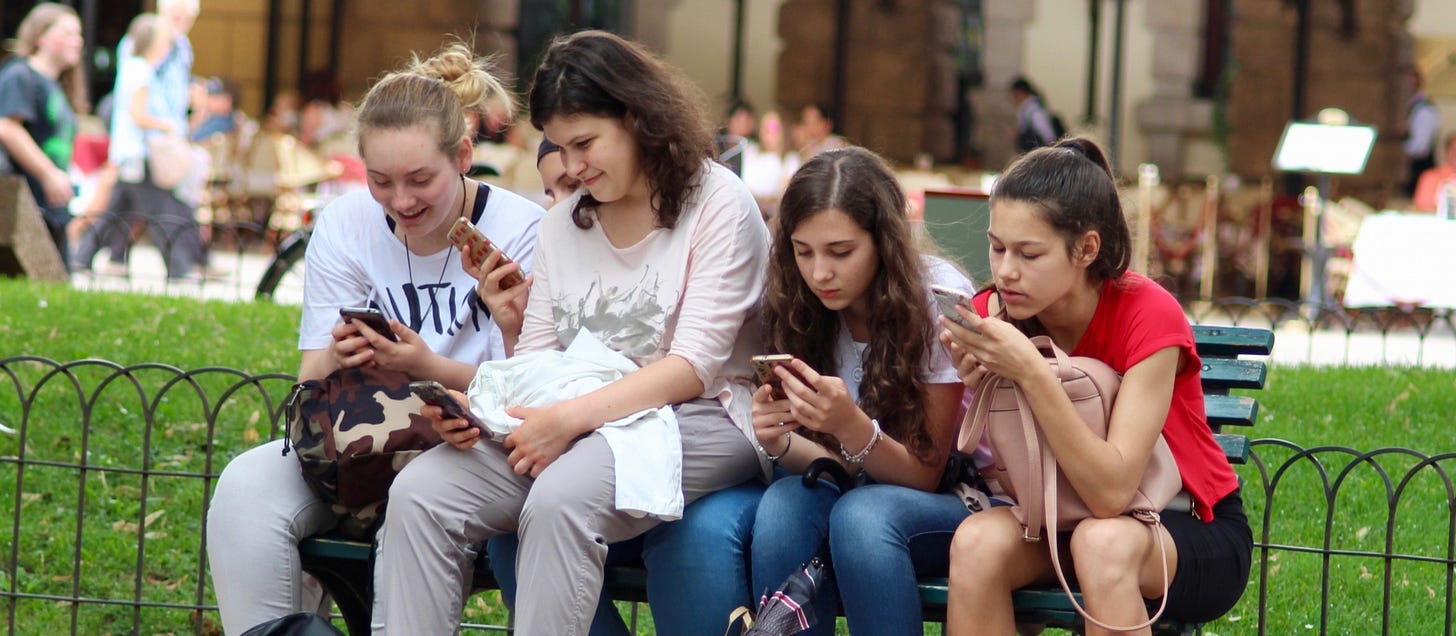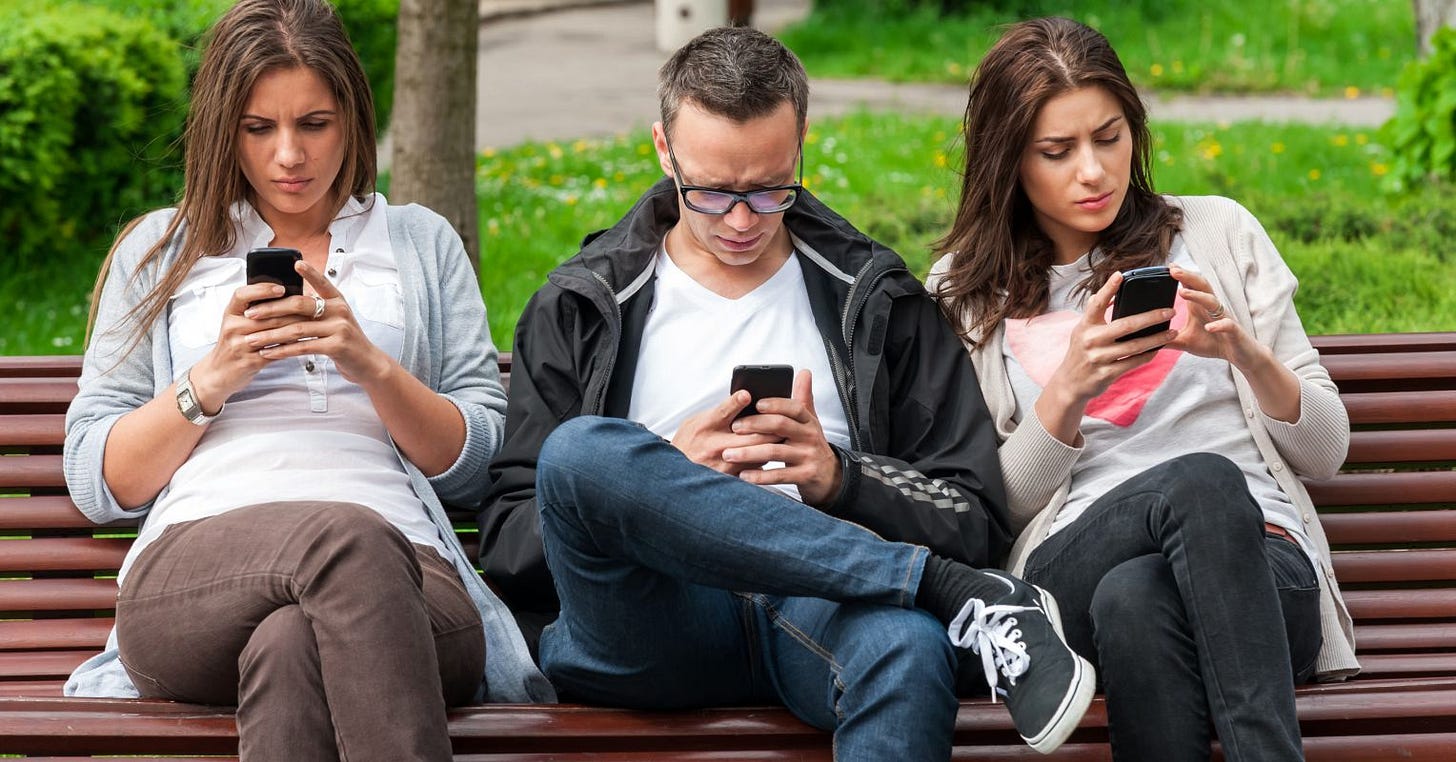I think “social media” is perhaps the worst technological development of the last 50 years. I can think of few other things that have so effortlessly rendered so much of life so much less pleasant than what is ultimately fewer than a dozen websites, most of them run by just a handful of companies.
There was a time when all of this was sort of fun—when the novelty of being connected to everyone, of being able to share your weekend’s idiot exploits with your dumb friends, of being able to form quasi-relationships with interesting people and get into meaningful arguments with total strangers, when all of that was at the very least gratifying and interesting. Yet it is almost hard to believe that that happy sort of equilibrium ever existed, that there was ever a time when social media wasn’t the miserable, stupid force for evil that it is today.
Let us consider this phenomenon’s total body count, and remember that this has all taken place over effectively less than a decade and a half, most of these websites having only really come into their own around 2007/2008 or so.
Social media has ruined the Internet. It is actually probably more accurate to say at this point that social media is the Internet, insofar as it is the primary driver of things happening on the Internet on a daily basis. But of course it all comes to the same thing. Younger readers will not remember this, but there was a time when the Internet was this weird, completely decentralized, frontier-like, freewheeling masterpiece of human ingenuity, essentially a purely ideational vehicle of pure information. Oh I mean yes, we had the Peanut Butter Jelly Banana, and of course they figured out a way to put grainy, creepy .mov pornography up there as soon as they possibly could, and I spent a fair amount of time in the Internet’s earliest days downloading shareware demos of MacSoft first-person shooters. It’s not like it was all the Library of Alexandria.
Still, the Internet pre-social media was a place that operated at a much more human scale of informational sharing. A vast array of decentralized message boards operated like public forums; a diverse range of blogs and personal websites created a kind of network of interesting writings, thoughts, ideas; a great deal of communication was carried out privately, via email, like it should be. It was good. It worked well and felt technologically advanced but very normal.
Needless to say, most of that has changed, drastically. It is not that there are fewer blogs, say, or fewer people reading them, or fewer people posting on message boards, or what have you; it is simply that the rhythmic pulse of the Internet has shifted away from a far more interesting intellectual landscape to a far more dreary, boring, tiresome, hysterical one—sort of the functional equivalent of taking a culture of book-reading and turning it into a culture of 30-second radio sound bites. And that sort of shift changes the operational premises of the thing in the first place. Sure, there are a great many talented people creating a great deal of excellent things for you to read and listen to and watch on the Internet these days. Does anyone deny that their work is vastly overshadowed by whatever’s trending on Twitter or Tik Tok—and perhaps more importantly that many of the Internet’s principle creators have significantly altered the way they do things in large part to fit the low-quality standards demanded by social media? Social sites are now for the most part the hub upon which the entire Internet spins, and it has made the Internet a shadow of what it once was, to say nothing of what it could be today.It has ruined daily life. A huge portion of our society now feels the need to document everything they do, at all times, with photos and video and saccharine text writeups of everything they experience, all the time, with the result that every public and private space is now potentially some kind of Internet experience waiting to happen. You must presume almost at all times that whatever you’re doing out in public has the potential to be recorded, photographed, and/or written about by someone and posted online. The normal and pleasing human sensation of having an experience—any experience—that is limited to yourself and the few people around you has more or less vanished. We have all become part of a world where nearly everything we do in the public world—every pleasure, every pain, every loss, every victory, every failure, every interesting thing, every boring thing—may very well be subject to the intense scrutiny and opinions and judgment of 1.8 billion other people. It sucks and it’s an awful way to live and if you tell me that’s not true I won’t believe you.
Aside from just sucking, this new arrangement also carries the risk of spreading profound social contagion—it can energize and amplify hysteria to legitimately dangerous levels. COVID-19 is a disease with a survival rate of well above 99% the most pressing public threat of which is the possibility that it might temporarily overwhelm local healthcare systems—and yet we shut down the entire world over it in the spring of 2020, in large part, I think, because angry nurses and doctors in Milan and New York City were ceaselessly posting pictures of themselves in goggles and N95 masks and screaming at us to “STAY HOME!!!” and sending everyone into emotional and hypochondriacal tailspins.It has made cowardice the default national character. More or less every community leader, every business owner, every public official, every CEO, the vast majority of average men and women—everyone is very, very frightened of being talked poorly about on social media, with the end result that we have become a country where self-censorship is the norm (at least if you want to express even the most mildly non-orthodox/non-progressive opinion) and pathetic apologies about everything are de rigueur. Just a short number of years ago, for instance, it would have been hard to imagine a world where the majority of the public would meekly, easily submit to allowing grown men to regularly enter female-only spaces like bathrooms and locker rooms in order to flash their genitals in front of prepubescent girls. Yet very, very few people actually want to speak out against this obviously depraved new standard, simply because they’re afraid that if they do so they’ll be spoken poorly of on Facebook or Twitter. Social media is one of the great equalizers of human history: It has democratized cowardice in ways nobody could have foreseen.
It is true that some people run the risk of serious professional consequences if they become part of a social media mob. Bosses and managers and supervisors are often—maybe usually—total cowards in the face of this zeitgeist too, after all, and so if you become the latest victim of a social media pile-on because you argued that girls should not have to be confronted with penises while they’re in the bathroom, it’s not unreasonable to expect that your boss will fire you (and issue an apology for hiring you in the first place). Thus everyone at every level has the incentive to become cowards, to encourage cowardice in others, and to allow obscenities and moral atrocities to flourish uninhibited.It has made us into more solitary, less sociable, less pleasant creatures. Go to any public place —a park, a mall, a restaurant, a city street, a library, anywhere—and what do you see?
What do you think most of these people are doing—reading Tolstoy? Debating theology? The kind of world we have before us—one in which phones are an endless, relentless, never-ceasing presence everywhere you go, all the time, and in which we see most of our fellow humans solely with their heads at 70º angles, permanently—simply doesn’t exist without social media. Phones would not have become the ubiquitous social cowbells—always present, always dangling, always drawing our attention—without the powerful motivating factor of social networks. As it stands, most of our public life is now dominated by the smart phone, and by the social media anchor weighing it down.
How do we solve this problem? The answer is obvious and easy: Get rid of social media. Just delete it from your phone and never look back. Your life will be happier and healthier. You’ll care less about what unimportant people think and you’ll care more about many other far more important things. Give yourself a taste of what life is like without this pernicious cultural force that has reshaped our public and private lives. I think you will enjoy it!






